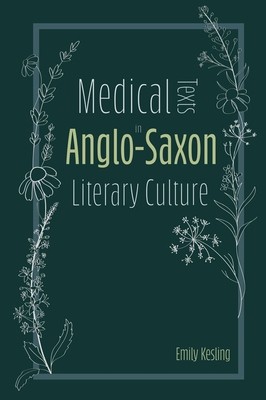
- We will send in 10–14 business days.
- Author: Emily Kesling
- Publisher: Boydell & Brewer
- ISBN-10: 1843845490
- ISBN-13: 9781843845492
- Format: 15.6 x 23.4 x 1.6 cm, kieti viršeliai
- Language: English
- SAVE -10% with code: EXTRA
Reviews
Description
Winner of the Best First Monograph from the International Society for the Study of Early Medieval England (ISSEME) 2021.
An examination of the Old English medical collections, arguing that these texts are products of a learned intellectual culture. Four complete medical collections survive from Anglo-Saxon England. These were first edited by Oswald Cockayne in the nineteenth century and came to be known by the names Bald's Leechbook, Leechbook III, the Lacnunga, and the Old English Pharmacopeia. Together these works represent the earliest complete collections of medical material in a western vernacular language.This book examines these texts as products of a learned literary culture. While earlier scholarship tended to emphasise the relationship of these works to folk belief or popular culture, this study suggests that all four extant collections were probably produced in major ecclesiastical centres. It examines the collections individually, emphasising their differences of content and purpose, while arguing that each consistently displays connections with an elite intellectual culture. The final chapter considers the fundamentally positive depiction of doctors and medicine found within literary and ecclesiastical works from the period and suggests that the high esteem for medicine in literate circles may have favoured the study and translation of medical texts.
EXTRA 10 % discount with code: EXTRA
The promotion ends in 22d.09:17:14
The discount code is valid when purchasing from 10 €. Discounts do not stack.
- Author: Emily Kesling
- Publisher: Boydell & Brewer
- ISBN-10: 1843845490
- ISBN-13: 9781843845492
- Format: 15.6 x 23.4 x 1.6 cm, kieti viršeliai
- Language: English English
Winner of the Best First Monograph from the International Society for the Study of Early Medieval England (ISSEME) 2021.
An examination of the Old English medical collections, arguing that these texts are products of a learned intellectual culture. Four complete medical collections survive from Anglo-Saxon England. These were first edited by Oswald Cockayne in the nineteenth century and came to be known by the names Bald's Leechbook, Leechbook III, the Lacnunga, and the Old English Pharmacopeia. Together these works represent the earliest complete collections of medical material in a western vernacular language.This book examines these texts as products of a learned literary culture. While earlier scholarship tended to emphasise the relationship of these works to folk belief or popular culture, this study suggests that all four extant collections were probably produced in major ecclesiastical centres. It examines the collections individually, emphasising their differences of content and purpose, while arguing that each consistently displays connections with an elite intellectual culture. The final chapter considers the fundamentally positive depiction of doctors and medicine found within literary and ecclesiastical works from the period and suggests that the high esteem for medicine in literate circles may have favoured the study and translation of medical texts.


Reviews